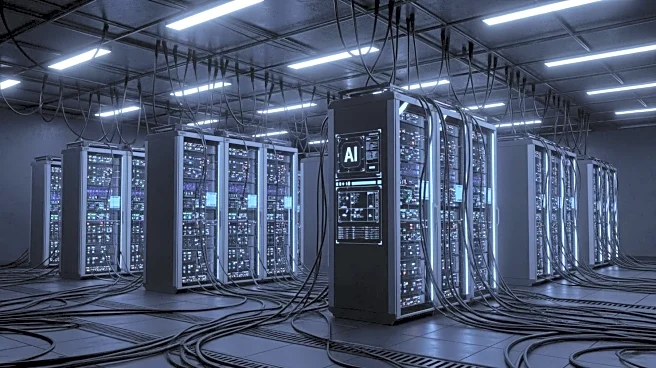What's Happening?
Nvidia has partnered with Deutsche Telekom in a €1 billion ($1.15 billion) initiative to establish an 'AI factory' in Munich, aiming to enhance Germany's AI computing capabilities by 50%. The project, named 'Industrial AI Cloud,' will utilize over 1,000
Nvidia DGX B200 systems and RTX Pro Servers with up to 10,000 Blackwell GPUs. This facility will provide AI inferencing and services to German companies while adhering to data sovereignty laws. Early partners include Agile Robots and Perplexity, with SAP providing business technology platforms and applications.
Why It's Important?
This partnership represents a significant investment in Europe's AI infrastructure, addressing calls from the European tech industry to reduce reliance on foreign providers and foster local alternatives. The project aligns with the EU's commitment to establishing 'AI gigafactories' for industrial applications, although funding in Europe remains lower compared to the U.S. The initiative underscores the strategic importance of AI in strengthening Germany's manufacturing and industrial sectors, offering opportunities for innovation and competitive advantage.
What's Next?
The AI factory is set to begin operations in early 2026, providing computing power to Germany's manufacturing industry. This development is part of the 'Made 4 Germany' initiative, which aims to invest €735 billion ($845 billion) by 2028 to bolster Germany's position as a business hub. As geopolitical shifts continue, the demand for sovereign cloud architecture is expected to grow, with companies moving sensitive data from public cloud to local storage. The project will contribute to the development of AI solutions and digital infrastructure for public institutions.
Beyond the Headlines
The focus on sovereign cloud solutions reflects broader geopolitical and regulatory trends in Europe, as countries seek to maintain control over critical data and infrastructure. The partnership between Nvidia and Deutsche Telekom highlights the intersection of technology and policy, with implications for data sovereignty and innovation. As AI becomes increasingly integrated into industrial applications, the legal and regulatory landscape will continue to evolve, requiring careful navigation to balance innovation with compliance.
















